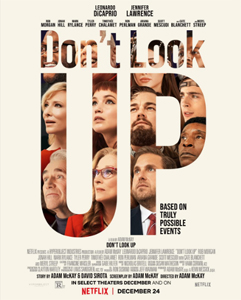Writer-director Adam McKay’s “Don’t Look Up” (2021, Netflix) makes fun of almost everything in American pop culture and government today. It’s intelligent, but rarely uproariously funny. I won’t likely revisit it, but I didn’t mind watching it, and it’s certainly appropriate that the absurd year of 2021 has this movie on its resume.
The end of the world as we (unfortunately) know it
More commentary than creative comedy, “Don’t Look Up” uses the structure of a disaster film in the vein of “Armageddon”: An extinction-level comet is headed toward Earth and will strike it with 99-point-something percent certainty in six months.
But the tone is satirical. McKay suggests a 20th century-style NASA mission could heroically destroy the comet, but 21st century American oligarchy is not so well equipped.
“Don’t Look Up” (2021)
Director: Adam McKay
Writer: Adam McKay (screenplay), David Sirota (story)
Stars: Leonardo DiCaprio, Jennifer Lawrence, Meryl Streep
Michigan State scientists Dr. Randall Mindy (Leonardo DiCaprio, trying for a Wisconsin accent) and Kate Dibiasky (a dressed-down Jennifer Lawrence) are frustrated at every turn by people’s reactions to this news. On a talk show, they can barely get the word out between the hosts’ quips. The hosts — Cate Blanchett and Tyler Perry — like to “keep it light.”
Mindy and Dibiasky do get the word out, but the issue becomes politicized, meme’d and giphy’d. After Kate’s on-air rant, an analytics team breaks down the web traffic. This scene is directly borrowed from another comedy, but I can’t remember which one. (Searching for “movie memes” is no help.)
Since Harry Stamper isn’t around, Ron Perlman plays the astronaut who will carry a nuke to blow up the comet. Attempting to be P.C., he accidentally says racist things. Well, he’s “from a different era,” his colleagues explain.
Power plays at the end of the universe
Kate gives the events important grounding. Her frustrations are our frustrations, and while she has flaws such as a Xanax addiction, she’s a good scientist with a solid core of values. We also meet Mindy’s salt-of-the-suburbs wife (“Yellowjackets’ ” Melanie Lynskey), and Dr. Mindy himself has somewhat of a character-growth arc. So that’s a few people I’d like to see survive.
Kleenex-worthy emotions don’t emerge at the level of “Armageddon” or “Greenland.” But I felt something for humanity, even if it’s only resignation and wistfulness for less stupid times. As McKay bombards us with self-interested and social-media-absorbed people, we automatically bring our own sadness as a counterpoint.

Since Kate isn’t in the thick of things like she’d be in the typical version of this story (she’s instead often hauled away by the FBI with a hood over her head), she has time to observe the small but steady injustices of life. During her seven-hour wait to tell President Orlean (Meryl Streep) about the comet, Army General Themes (Paul Guilfoyle) charges her $20 for food and drink he got for free from a White House breakroom.
Extrapolate his petty power play to higher levels, and you get the core “theme,” making the general’s name appropriate. Humanity’s survival might be doomed by power (gaining it, keeping it, sharing it) factoring into important governmental decisions. (As a next step that the film itself doesn’t take, we might ask “Should anyone have this much power?”)
Plenty of targets to choose
“Don’t Look Up’s” critique of authority is not a surprise coming from McKay, who gives an outline of the government’s “too big to fail” schemes in what’s otherwise a goofy buddy-cop comedy, “The Other Guys” (2010).
But what specific news issue is “Don’t Look Up” targeting? Interestingly, several things could fit. I found the approaching comet stands in for climate change. By compressing the timeline into six months, we get a stark picture of how a government with special interests parasitically attached can’t handle a global threat. However, the friend I watched the film with says it’s about the pandemic. We might both be right.
“Don’t Look Up” makes fun of both powerful political parties, but does it lean one way? The grand finale finds the Look Up crowd putting on a celebrity-laden concert and the Don’t Look Up crowd holding a political rally. My friend (who is not right-leaning) felt the film takes more pokes at the right.
He might be correct, as McKay seems to be saying the left’s excesses are idiotic but the right’s excesses are immediately dangerous. The fact that she’s a woman is initially distracting, but it becomes clear that Orlean represents Donald Trump when MAGA-style hats pop up at the rally.
Because he’s the biggest campaign donor, Peter Isherwell (Mark Rylance) has the president’s ear. This behind-the-curtain influencer has aspects of Bill Gates, Anthony Fauci, Elon Musk and – when he sniffs a female colleague’s hair – Joe Biden.
Satire or snapshot?
Maybe “Don’t Look Up” will tick off rightists, maybe leftists, maybe both. McKay’s desire to cover all the bases – to remind everyone they should be ticked off by everything — makes the film oddly safe, rather than biting.
I can see it being divisive on comedy grounds. Satires don’t need to be 138 minutes long, especially when they are making one main point. (It should’ve mimicked the tighter and funnier “The Campaign,” which comes from a McKay story.) Still, “Don’t Look Up” has a great cast (see also Ariana Grande making fun of pop-star personas, and Jonah Hill being the ultimate worthless power-holder).
And while this isn’t the first end-of-the-world comedy, it’s a good time for a new one, because the world around us has altered the very nature of satire. McKay’s satire comes off as a snapshot. (Or maybe “photo gallery” is the better metaphor. Each image of modern stupidity counts as one click. You won’t believe No. 7!)
Decades down the road (if the human race still exists), we can screen “Don’t Look Up” and say, “Yep, that’s how it was.”

